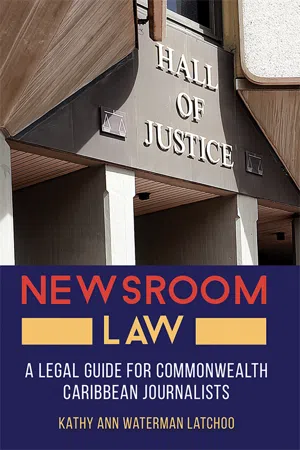
Newsroom Law
A Legal Guide for Commonwealth Caribbean Journalists
- English
- ePUB (mobile friendly)
- Available on iOS & Android
About this book
This book is meant to guide, comfort and support journalists. While they may chafe against the many legal restrictions, they should know that there is a lot they can do and say within the law. With a better understanding of their legal rights, journalists can go about their business with greater confidence, knowing when to yield and when to stand firm.
Kathy Ann Waterman Latchoo begins by placing journalism in a constitutional context and ends with an overview on damages for defamation and a glossary of legal terms. She describes our legal systems and the hierarchy of courts, which every journalist should strive to understand, whether or not assigned to the court beat. In Newsroom Law, she seeks to demystify libel law, including the Reynolds public interest defence, which has put fresh emphasis on what constitutes "responsible journalism". Other chapters alert journalists to the legal pitfalls in covering parliamentary affairs, elections and court cases. Cyber-libel, copyright and freedom of information are also included and the chapter on investigative journalism seeks to answer common questions such as whether photographers may use telephoto lenses to capture people in private; whether journalists may record conversations covertly; and whether it is ever permissible to break the law to expose evil.
Frequently asked questions
- Essential is ideal for learners and professionals who enjoy exploring a wide range of subjects. Access the Essential Library with 800,000+ trusted titles and best-sellers across business, personal growth, and the humanities. Includes unlimited reading time and Standard Read Aloud voice.
- Complete: Perfect for advanced learners and researchers needing full, unrestricted access. Unlock 1.4M+ books across hundreds of subjects, including academic and specialized titles. The Complete Plan also includes advanced features like Premium Read Aloud and Research Assistant.
Please note we cannot support devices running on iOS 13 and Android 7 or earlier. Learn more about using the app.
Information
CHAPTER 1
FREEDOM OF EXPRESSION
Without effective freedom of expression, materialized in all its terms, democracy vanishes, pluralism and tolerance start to break down, the mechanisms of citizen oversight and complaint start to become inoperable, and, in short, fertile ground is created for authoritarian systems to take root in society.—Herrera Ulloa v. Costa Rica1
The exercise of those freedoms, since it carries with it duties and responsibilities, may be subject to such formalities, conditions, restrictions or penalties as are prescribed by law and are necessary in a democratic society, in the interest of national security, territorial integrity or public safety, for the prevention of disorder or crime, for the protection of health or morals, for the protection of the reputation or rights of others, for preventing the disclosure of information received in confidence, or for maintaining the authority and impartiality of the judiciary.
Nothing contained in or done under the authority of any law shall be held to be inconsistent with or in contravention of this section to the extent that the law in question makes provision:
- that is reasonably required in the interests of defence, public safety, public order, public morality or public health; or received in confidence, maintaining the authority and independence of the courts or regulating the administration or technical operation of telephony, telegraphy,
- that is reasonably required for the purpose of protecting the reputations, rights and freedoms of other persons or the private lives of persons concerned in legal proceedings, preventing the disclosure of information received in confidence, maintaining the authority and independence of the courts or regulating the administration or technical operation of telephony, telegraphy, posts, wireless broadcasting, television or other means of communication or regulating public exhibitions or public entertainments; or that imposes restrictions upon public officers or members of a disciplined force.
freedom of speech is the lifeblood of democracy. The free flow of information and ideas informs political debate. It is a safety valve: people are more ready to accept decisions that go against them if they can in principle seek to influence them. It acts as a brake on the abuse of power by public officials. It facilitates the exposure of errors in the governance and administration of justice of the country.
NO PRINT FIT FOR NEWS
Table of contents
- Cover Page
- Title Page
- Copyright Page
- Dedication
- Contents
- Table of Cases
- Foreword
- Acknowledgements
- Introduction
- 1. Freedom of Expression
- 2. How the Courts Work
- 3. Defamation
- 4. Cyberlibel
- 5. Defences
- 6. The Reynolds Defence
- 7. Court Reporting
- 8. Contempt of Court
- 9. Reporting Parliament
- 10. Election Reporting
- 11. The Broadcast Journalist
- 12. The Investigative Journalist
- 13. Privacy and Confidence
- 14. Freedom of Information
- 15. Copyright
- 16. Damages
- Appendix
- Glossary
- Notes
- Selected Bibliography
- Index